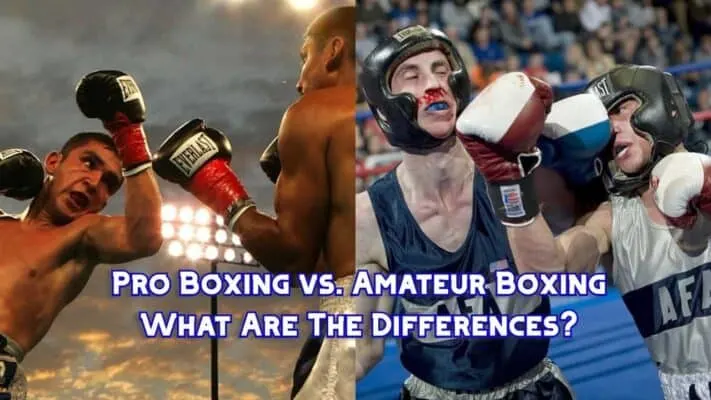
Boxing is one of the earliest martial arts or combat sports in our human history, but differences have evolved in the sport between two main camps. Professional boxing and amateur boxing come from the same roots but are quite different sports. What main differences divide professional and amateur boxing into two different disciplines?
The differences between professional and amateur boxing are remuneration, training, boxing style, and the format of the sports. The aim of professional boxing is entertainment, and big hits and knockouts are key. Amateur boxing is sport-oriented, and the aim is to score points.
Professional boxing and amateur boxing have the same basic foundation, but each type of boxing has different goals in terms of the purpose of the sport and the rules that govern each sport. We will examine these differences to establish what sets them apart from each other.
What Is The Difference Between Professional Boxing And Amateur Boxing?
Boxing has evolved over the years into two main streams of the sport. The professional boxing world is significantly different from the amateur boxing world. This impacts the way the fighters train and what is expected from them in the ring.
The main differences between professional and amateur boxing are as follows:
- Payment. Professional boxers box for money, and it is their job, while amateur boxers do not box full time but rather as a sport. Professional boxers get paid large fees for fights since it is their livelihood. Amateur fighters do not earn money directly for a bout but can get paid indirectly. Earnings are usually low, and they have a ceiling of earnings to retain amateur status.
- Knockouts. Professional boxing aims to knock the opponent out to win the bout, while the main aim of an amateur bout is to win on points.
- Big hits. Professional boxers try to do as much physical damage to their opponents as possible. This gains points and wins on technical knockouts. Amateur boxing focuses on technique and aims to outbox the opponent and score more points than the opponent rather than injure them.
- Entertainment. Professional boxing is all about entertaining the crowd, which is where the revenue for paying the fighters comes from. Amateur boxing is all about the sport aspect of boxing rather than crowd entertainment.
- Protective headgear. Amateur boxers wear protective headgear to help protect boxers from knockouts and the associated injuries. Professional boxers do not wear protective headgear.
- Different gloves. Amateur glove color is limited to red or blue, often with a white area on the front, and all point-scoring blows on the opponent must be landed with the white area of the gloves.
- Ring size. The ring size for amateur bouts must be between 16 by 16 feet and 20 by 20 feet to be a legal ring. Ring sizes for professional bouts can differ.
- Amateur bouts are shorter. Male amateur boxing bouts are a maximum of 3 rounds, with each round being 3 minutes in duration, while female bouts are 4 rounds of two minutes each. Professional boxing bouts are usually 12 rounds of 3 minutes duration each.
RECOMMENDED FOR YOU: Is Boxing Considered A Martial Art? Yes, Here’s Why
What Makes Someone An Amateur Boxer?
An amateur boxer will generally have a career outside of boxing and will participate in boxing as a sport rather than their main income-earning stream.
Amateur boxers train very differently, focusing on speed and boxing techniques. Since amateur boxing bouts are short, less stamina is required, but speed, accuracy, and technique are important to score as many points in the 3 rounds as possible.
Male amateur bouts are a maximum duration of 3 rounds, with each round lasting 3 minutes. Since only clean, accurate blows count for points, the amateur boxer trains for this aspect of the sport to maximize their point-scoring opportunity in the short bouts. The rest period between every round is 1 minute.
RELATED: What Is Golden Gloves Boxing? Everything You Need to Know
What Is A Professional Boxer?
A professional boxer is someone who has chosen to box as a career and earn their living through the sport. The prize money in a bout can be substantially more than for an amateur bout.
Professional bouts can last up to 12 rounds of 3 minutes each and the rest period between every round is 1 minute, making stamina a key aspect of a professional boxer’s training regime. Professional boxers also train for strength and power in their punches since the main aim of the fight is to knock out or incapacitate the opponent, although points scored can also win a fight.
A professional boxer will train every day since it is their job and will focus on strength, power, and stamina in their training.
Can An Amateur Boxer Beat A Pro?
If an amateur boxer took on a professional boxer using professional boxing rules, it would be unlikely that the amateur boxer would win the bout. The strength and stamina of the professional would overwhelm the amateur boxer.
If an amateur boxer took on a professional boxer in a bout with amateur rules, the amateur boxer stands a chance to win the bout on points if he can keep out of reach to prevent the professional boxer from landing heavy blows.
RECOMMENDED FOR YOU: Is Boxing Good for Self Defense? The Ultimate Answers
What Is The Age Limit To Enter In The Amateur Boxing Field?
People can start amateur boxing as young as 13, but sanctioned amateur bouts have both an upper and a lower age limit.
The age for competing as an amateur boxer is officially between the ages of 13 and 40 years of age. While you can train in boxing above the age of 40, you will not be allowed to participate in competitive bouts.
Do Amateur Boxers Get Paid?
Amateur boxers do not generally get paid directly for their bouts, but there are ways for the fighters to be compensated and still retain amateur status.
Amateur boxers can receive money from endorsements, government grants, and boxing federations. Most amateur boxers do not get paid, but some promoters pay amateur fighters where they see talent to help the boxer achieve higher standards with the view of them going pro.
How Many Amateur Bouts Do You Need To Fight In Pro Boxing?
There are no criteria that must be met to become a pro boxer. Therefore as amatuer boxers, there is no magic number of amateur bouts required before an amateur boxer will be allowed to fight professionally. The criteria depend on the individual fighter and when they are ready physically to participate in a professional bout.
Some amateur fighters can get to this point after a few amateur bouts, while others may need 150 bouts or more before they are ready for the pro boxing world. That being said it is recommended to have around 20 amateur fights under your belt before turning into a professional boxer.
In contrast, there have been instances where some people have learned to box while serving in the military or even while incarcerated and they became pro boxers without having any amateur bouts. Without amateur experience, however, it’s difficult for someone to succeed as a pro.
How Do You Become A Pro Boxer?
Most amateur boxers go professional after competing in major tournaments such as the Olympics or a similar prestigious tournament.
Many professional boxing scouts scour the amateur boxing gyms looking for talent in the amateur arena that may translate to a successful professional boxing career.
As a result, the most common ways to go pro are to excel in a prestigious amateur boxing tournament or work hard enough to gain sufficient skills to be noticed at the gym by a professional boxing promoter.
The route to becoming a professional boxer is to first join a gym, train, get a good coach, obtain an amateur boxing license, win some bouts, excel at a prestigious tournament, hire a manager, earn a professional boxing license and work hard to improve your skills.
RECOMMENDED FOR YOU: MMA vs. Boxing: Which Is Harder To Learn? (Best Explained)
Why Are Pro Boxers Not Allowed To Compete At The Olympics?
Professional boxers are not allowed to compete at the Olympics because the Olympic games are for amateur athletes.
Professional boxing is also a completely different sport from amateur boxing, with different rules and expected outcomes.
Are Olympic Boxers Better Than Professional Boxers?
Olympic boxers are good boxers in the amateur boxing arena but are not necessarily better than professional boxers.
Olympic boxers will generally not win a bout against a professional boxer when fighting with professional boxing rules. This is due to the differences in the focus of the training method for the two different boxing types.
Why Do Some Amateur Boxers Not Go Pro?
There are several reasons that all amateur boxers do not go professional. Some amateur boxers do not have the skills to enter the professional boxing arena. Other amateur boxers are not interested in the professional side of boxing and prefer boxing as a sport as an amateur boxer.
Many people are not interested in professional boxing due to the probability of sustaining severe injuries during the sport. There is a lesser likelihood of these types of boxing injuries occurring when boxing at the amateur level.
Conclusion
Amateur and professional boxing may seem very similar at first glance. However, these two disciplines of boxing are seen as two separate sports.
The difference between the two are not only the remuneration but the training techniques and the structure of the bouts and determination of wins differs substantially between the two sports.
Amateur boxing is the platform from which most professional boxers begin their career, but many amateurs choose not to go the professional route.
